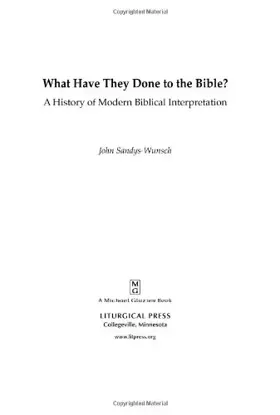

What Have They Done to the Bible: A History of Modern Biblical Interpretation
Pages
378
Publisher
Michael Glazier Books
Published
6/30/2005
ISBN-13
9780814650288
Reviews
Collegeville, Minn.: Liturgical Press, 2005. Pp. xx + 378. Paper. $39.95. ISBN 0814650287. Jan van der Watt University of Pretoria Pretoria, South Africa At the end of the preface Sandys-Wunsch makes reference to a saying by Winston Churchill concerning another politician: “He is a modest man; so much to be modest about.” Sandys-Wunsch then applies this saying to himself because after thirty years of work on the subject he confesses that he is left with a strong sense of his own ignorance. To be honest, I think this is the feeling most of the readers will have about their own insights after reading this book. Sandys-Wunsch has opened up a world of activity surrounding the Bible and its interpretation that heightens one’s awareness to the reality that biblical scholars today are just one small gear in a large machine. One quickly comes to realize that through the ages people were serious about their understanding of the Bible, had reasons for reading the Bible in the way they did, and always did it as children of their time. We realize that our roots of who we are and what we do as biblical scholars lie deeply imbedded in this history, but we also realize that we are not who they are—they rightly belong to the past, and we are children of our time. This book gives an overview of the history of biblical interpretation stretching from 1450 to 1889, this being, of course, the period starting with the Renaissance and leading up to the critical nineteenth century. In an introductory chapter (ch. 1) the nature and concerns of biblical exegesis are discussed.
[Full Review]
Graduate Theological Union/University of California-Davis Berkeley, CA 94709 What Have They Done to the Bible? is an engagingly written, accessible introduction to the history of Western Christian biblical interpretation from 1450 to 1889. It tells the story of the “dethronement of the Bible,” or the movement from an approach to biblical study in which the Bible (or its traditional interpretations) is the source of all knowledge to an approach in which even the Bible can be judged and evaluated on the basis of science and history. In this narrative, eighteenth century developments are central, and this book argues that it was in the eighteenth century that both the scientific approach to the Bible and pietistic and theological responses to it took their modern shape. The book covers a wide range of modern thinkers and exegetes, with a special focus on eighteenth-century writers. It treats Protestant and Catholic exegetes for the most part together, presenting their similarities as more important than their differences. The central argument of the book is that eighteenth-century developments were crucial in shaping modern biblical exegesis. The developments, however, were not linear and were certainly not a straight progression from obscurantism to rationality. The author rejects both Frederick Farrar’s and Alistair McGrath’s views of the history of biblical interpretation as a simple line, progressing either up or down from faith-based to scientific exegesis.
[Full Review]
